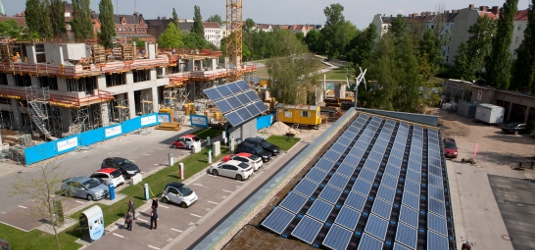SolarPower Europe, the Brussels-headquartered European solar body, has ramped up its efforts to support the digitalization of solar on the continent by publishing today ten regulatory asks for EU leaders.
The thrust of SolarPower Europe’s latest campaign – which follows closely on the heels of the Electrification Alliance announced last week – is that a smarter, more digital energy network in Europe can facilitate the wider deployment of solar, and vice versa.
The ten ‘asks’ essentially place reminders under the noses of EU decision-makers for the need to maintain the pace of energy transition with solar and digitalization at the forefront. Earlier this month at Intersolar Europe in Munich, SolarPower Europe issued its seven commitments of digitalization.
This latest call-out offers more tangible suggestions for Europe, and includes:
- Removing barriers to the peer-to-peer trading of electricity, thereby expediting the sharing of decentralized power;Solarpraxis AG/Andreas Schlegel
- Ensuring that the implementation of regulation does not preclude new technologies and business models, ie, frameworks should be open to Blockchain and other cryptocurrencies that create incentives for PV and prosumers;
- Use digitalization to develop flexibility markets with more automated tools;
- Reform intraday and spot-markets to enable large-scale solar and solar+storage to take on balancing responsibilities;
- Accelerate the deployment of smart grid technology and smart metering functionality, and;
- Ensure that EU-level work on standards and interoperability within the digital single market includes solar PV, smart buildings and smart grids.
“The right regulatory framework is an essential foundation for the development of digital solar,” said SolarPower Europe’s digitalization task force leader Bernd Engels. “We need policymakers to accelerate the deployment of smart grids, reform incentives for network operators and reward the speed and accuracy that solar can provide in grid support services.”
SMA’s business development manager Detlef Beister added that the industry wants to see policymakers use digitalization to develop better flexibility markets so that solar can properly take part, with smart metering functionality augmented “in a way that does not discriminate against solar prosumers”
This content is protected by copyright and may not be reused. If you want to cooperate with us and would like to reuse some of our content, please contact: editors@pv-magazine.com.



By submitting this form you agree to pv magazine using your data for the purposes of publishing your comment.
Your personal data will only be disclosed or otherwise transmitted to third parties for the purposes of spam filtering or if this is necessary for technical maintenance of the website. Any other transfer to third parties will not take place unless this is justified on the basis of applicable data protection regulations or if pv magazine is legally obliged to do so.
You may revoke this consent at any time with effect for the future, in which case your personal data will be deleted immediately. Otherwise, your data will be deleted if pv magazine has processed your request or the purpose of data storage is fulfilled.
Further information on data privacy can be found in our Data Protection Policy.